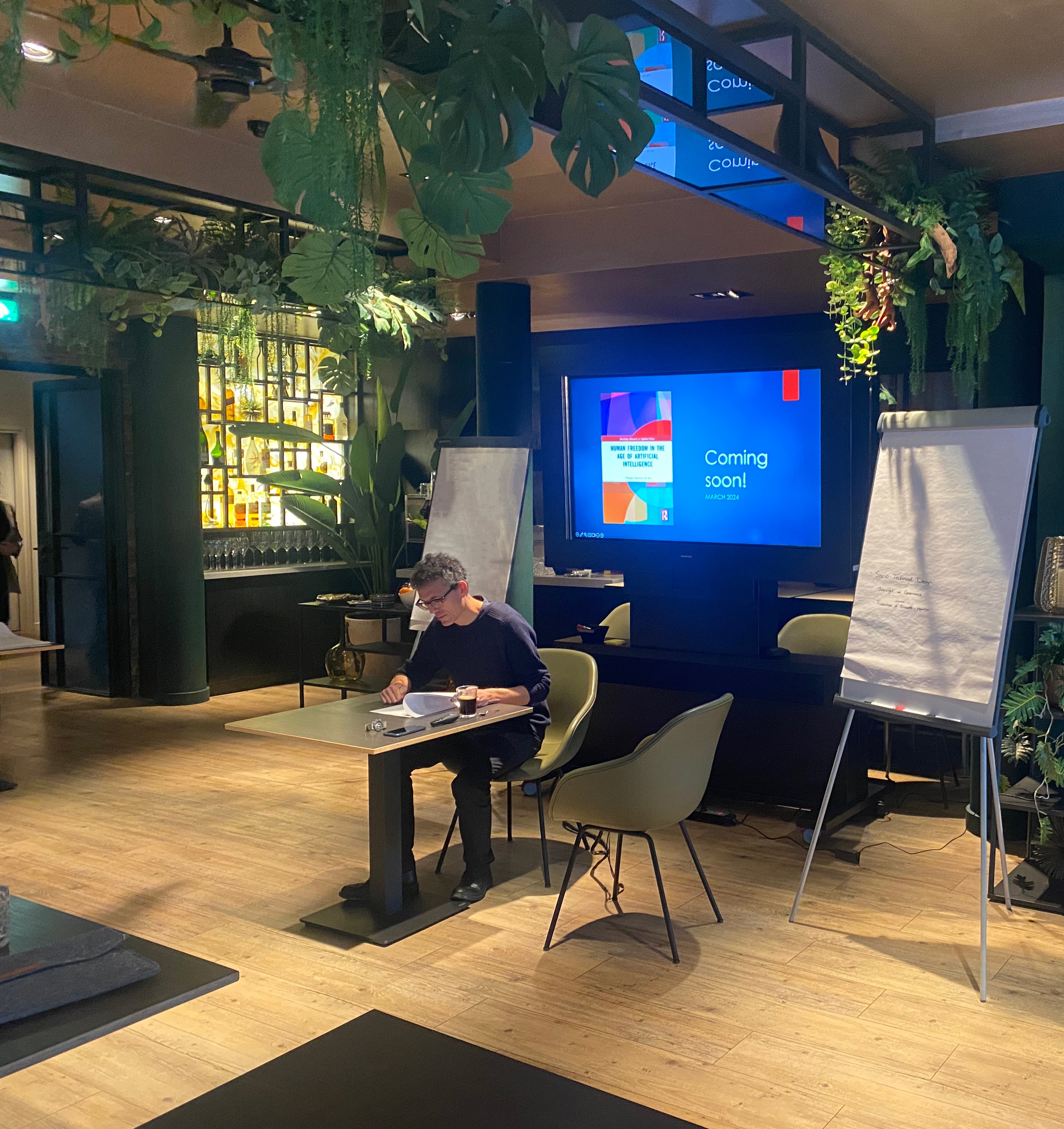Book launch: Human Freedom in the Age of AI, by Filippo Santoni De Sio
Filippo Santoni De Sio is an Academic philosopher and professor specialized in interdisciplinary work in ethics of technology, with a special interest in the ethics of AI.
His drive to pave new paths in the field led him to write Human Freedom in the Age of AI, set for release in March 2024. The upcoming book launch provided an ideal opportunity to interview Filippo and learn about what inspired him to write the book, his background, research interests, and his future research directions.
Associate Professor
INTERVIEW
Authors: Beatriz Lafuente Alcazar & Helma Dokkum
Who are you and what brought you to Delft?
Twelve years ago I started as a postdoc in Delft and now I am an Associate Professor. I am involved in AI ethics research in different areas such as robotics, defence and transportation. One common thread in my work is moral responsibility: I did a PhD on the philosophical foundation of criminal responsibility and I now work on moral responsibility for the behaviour of AI systems, among other things.
Before coming to Delft I studied history of Philosophy in Torino, then I moved towards more applied ethics. Since I moved to Delft I have started investigating issues of human moral responsibility in relation to the design and use of emerging technologies. Besides, I am an associate editor at the Journal of Ethics.
What inspired you to start writing the book?
What inspired me the most was the urge to synthesize work already done and opening up new avenues for research. Writing a book is different from more daily academic work. I got older, more experienced and involved in more and more collaborations and activities. I did not manage to take the time to sit down and think of the bigger story. I wanted to allow myself to find time for long reflections on bigger philosophical challenges. It worked out (too) well: I spent more time writing than earlier anticipated. However, it also turned out to be a more valuable work than I initially thought. I am really satisfied by how much I have been able to cover.
Can you give examples on these bigger philosophical challenges?
There are differences in concepts of freedom. I wanted to reflect on how they relate and how to apply these different concepts of freedom in different domains. An example is freedom in relation to workforce management in the so-called gig economy, or freedom of people in relation to big digital platforms owned by private tech companies. The last part of the book talks about democratic theories. I wanted to connect them to AI and design, also from the perspective of global democracy, and decoloniality.
Another important philosophical challenge for design for democracy is the fact that both design theory and democratic theories have historically been human-centred. One big question is how to include the interests of the planet more systematically in our design and democratic practices (more-than-human democracy and more-than-human design).
Democracy and AI – some big terms. What do you mean? And why is it important?
Quoting Churchill, perhaps democracy is not an ideal form of government, but all others are worse.
Democracy is a difficult concept to define, it involves many different values and principles. It is important to identify which elements are crucial to preserve, which presents a significant philosophical challenge. With the rise of technology, we have seen how AI and technology can undermine human rights, for instance, in cases of authoritarian governments supported by technology. The Cambridge Analytica scandal is another good example. Cambridge Analytica used facebook data for targeting people for political campaigns. In the book I recognize this important concern. We must understand the negative impact of AI and technology, and why this is a problem for democracy. However, in my book I also talk about the positive side of AI, about the need to understand the principles of democracy and to design for them in digital technologies. This is what I try to cover in the last part of the book, creating a more inclusive and balanced discussion. For example, digital technology can be used for more inclusive discussions by using digital platforms such as social media. However, one thing is clear: if we want to design for democracy, we need to know what its direction should be.
How can we overcome these challenges?
I cover two approaches in my book: design practices that help dealing with these challenges and democratic theories.
I discuss ethical issues in design and approaches to support them. During the writing process, I worked with colleagues from industrial design engineering, who introduced me to different design methodologies. These approaches – such as participatory design, social design – can be complementary to value sensitive-design and are very insightful for designing systems that comply to values, but also for political issues with technology. In the book I further explore how these approaches can be used.
I also discuss democratic theories. In the book I look at the dimensions of democracy power contestation, aesthetic engagement and decolonial practices and then make tentative statements on how technology can support these dimensions of democracy. The last part of the book is pretty much a map of how design approaches can support democratic design.
Then you also talk about Meaningful Human Control (MHC). That is something we hear a lot now?
Together with my colleagues Jeroen van den Hoven and Giulio Mecacci, I introduced this term to the philosophical domain, but it was already widely used in international law discussions about autonomous weapon systems. We gave it more philosophical substance. We believed that this concept could be applied to AI and technology as a design practice rather than it being just a regulatory concept and could be applied to many more domains.
We have a forthcoming multidisciplinary co-edited Research Handbook on Meaningful Human Control of AI systems and we are establishing a Delft Centre for Meaningful Human Control coordinated by David Abbink, complementary to the Delft Digital Ethics Centre, with a strong engineering focus, bridging the worlds of philosophy and technology even further.
How does it feel to have the book ready to be published?
The night before I shared this story during the retreat I sent the last iteration to the publisher at 1 AM. It seemed like one chapter was ending and another one beginning. The writing is over and now I can enjoy the energy it gave me. The feeling of closure is great, but at the same time, it feels like the book is more of an opening to many more opportunities for research and collaborations. I look forward to reconnect with people and continue discussions brought up by the topics in the book.

Filippo reading his book's preface at Delft Digital Ethics Centre Writing retreat January 2024
What topics do you want to address in the future?
There are two directions I want to continue exploring. On the one hand, I am interested in different approaches that can be used to address ethical issues from design. I would like to explore more in-depth how these approaches can be used and delivered. On the other hand, I want to dive deeper into the democratic theories that I introduce in the final part of the book.
Also, in relation to artistic engagement - I have been involved in projects that combine art, empathy, and ethics. They focus on using performative arts as a way to engage students, on more than only on a rational level. Introducing performative arts to students with engineering backgrounds and combining it with philosophy brings a very interesting dynamic. The aim is to help students see the world through different eyes, using art to educate our senses. That is a dynamic I want to further explore.
What are your expectations for the book?
When I began writing the book, I did it because of the reasons mentioned before, but I now imagine that the book could also serve as an introduction to AI ethics and could be a valuable research handbook. The span of the topics I cover and the style I use keeps the academic rigor but also makes it more accessible than research articles, also for people outside of philosophy.
I am very curious to see the reaction of the public. Curious to find out how valuable it is for people outside of academia. The book could be relevant for policymakers or in general for anyone that wants to understand the interplay between ethics and technology, although it does remain an academic book.
Anything you would like to add?
I really want to recognize all the big contributions made by colleagues. Such projects are also a collective effort and the book is a result of lots of conversations and encounters I have had with colleagues and friends. I am so grateful for that.
The more people we can get interested in AI ethics, the better! Would you like to know more? A TPM research colloquium will be organised shortly
The book ‘Human Freedom in the Age of AI’ can be preordered and will be available via this link.
